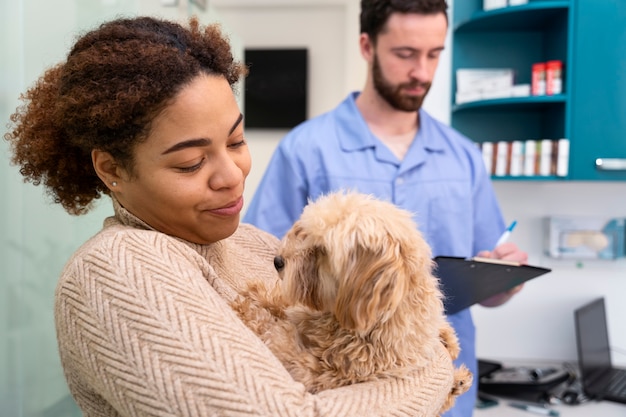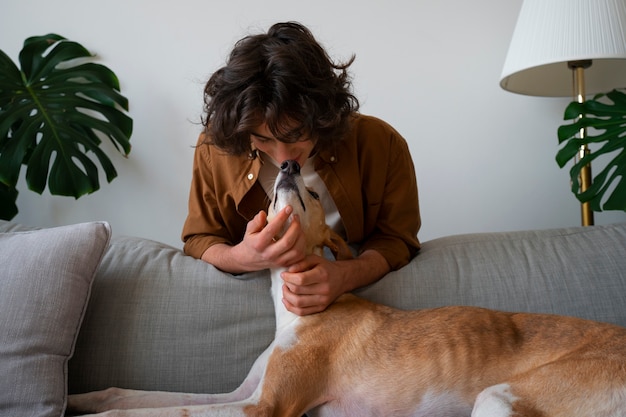What to Expect During a Routine Pet Surgery


What to Expect During a Routine Pet Surgery
When your beloved companion is scheduled for pet surgery, it’s only natural to feel a mix of concern and uncertainty. Whether your veterinarian has recommended a spay or neuter, dental procedure, or another routine veterinary procedure, knowing what to expect can help bring peace of mind. At The inFURmary, your trusted family-owned veterinary clinic in San Diego and surrounding communities, we believe that informed pet owners make the best decisions for their pets. In this guide, we’ll walk you through each step of the routine pet surgery process, from the initial consultation and safety measures to what happens in recovery and how you can support your pet at home.
We know how important it is to feel confident in your veterinary team. Our veterinarians are dedicated to providing comprehensive care, including wellness exams, advanced diagnostics, and collaborative specialist support, all under one roof. If you’re searching for a "vet near me" who puts your pet’s safety and comfort first, you’ll find compassionate, knowledgeable care here at The inFURmary. Throughout this post, you’ll discover valuable insights on pre-surgical preparation, anesthesia safety, and what you can do to ensure your pet’s smooth healing. For more details about the types of surgeries we provide, visit our page on veterinary surgical services.
Recognizing When Routine Pet Surgery Is Needed
Common Scenarios for Routine Veterinary Procedures in San Diego
Pet owners may wonder when routine pet surgery becomes necessary. Typically, your veterinarian will discuss surgical options during regular wellness exams, which are essential for monitoring your pet’s ongoing health. Routine veterinary procedures in San Diego often include spaying and neutering, dental cleanings, mass removals, and minor soft tissue surgeries. The need for these surgeries can arise from preventive recommendations, like spaying or neutering to prevent certain diseases, or as a result of findings during an annual checkup, such as discovering a broken tooth or a benign lump.
Key signs your pet may need a routine surgical procedure include persistent dental issues like foul breath, difficulty eating, or visible tartar build-up; noticeable masses or lumps under the skin; and reproductive status in young pets. Additionally, your veterinarian might recommend surgery if your pet is experiencing chronic ear infections, small tumor growths, or other conditions that haven’t improved with medications alone. If you notice any of these signs, it’s important to schedule an appointment so our veterinary professionals can assess your pet’s needs and discuss the safest options for their specific situation.
Understanding the Reasons Behind Routine Pet Surgeries
Why Do Pets Need Surgery?
There are several reasons your veterinarian might suggest a routine surgical procedure for your pet. Spaying and neutering remain among the most common surgeries performed and are vital for population control and long-term health. These procedures can help prevent reproductive cancers, certain infections, and unwanted behaviors. Dental surgeries, such as cleanings or extractions, are crucial for maintaining oral health and preventing systemic diseases that can arise from untreated dental problems.
Other common reasons for surgery include the removal of benign masses, addressing minor injuries or wounds that require suturing, and correcting congenital issues. In San Diego, routine pet surgery often aligns with preventive care protocols tailored to our local climate and lifestyle, where pets are active outdoors year-round and may be at higher risk for certain conditions. Choosing a veterinary clinic with a full range of in-house diagnostics and collaborative specialist support, like The inFURmary, ensures that all aspects of your pet’s health are considered before proceeding with any surgery.
Before surgery, our veterinarians perform a thorough wellness examination to identify any underlying health concerns that could affect anesthesia or recovery. We may also recommend laboratory tests or imaging, such as bloodwork or digital radiology, to ensure your pet is a good candidate for anesthesia and surgery.
What Happens During Routine Pet Surgery in San Diego
The Surgical Process Step by Step
When your pet is scheduled for surgery at The inFURmary, you can expect a carefully coordinated process designed for safety and comfort. The journey begins with a pre-operative assessment, which may include a physical exam, laboratory testing, and, in some cases, diagnostic imaging. These steps allow our veterinary team to tailor anesthesia and surgical protocols to your pet’s specific needs.
On the day of surgery, your pet will be admitted to our clinic, where our veterinarians and support professionals will review their medical history and answer any last-minute questions you may have. Anesthesia protocols are chosen based on your pet’s age, breed, health status, and the type of surgery being performed. Throughout the procedure, your pet is closely monitored by veterinary professionals using advanced equipment to track vital signs and ensure stability.
Routine veterinary procedures in San Diego, such as spays, neuters, or dental cleanings, generally take less than a couple of hours. After the surgery, your pet is moved to a quiet recovery area, where they are continuously observed as they wake from anesthesia. Our team is trained to address any discomfort promptly, and we use a combination of medications and supportive care to keep your pet as comfortable as possible. For detailed information about how we manage pain after surgery, you can read more on our pain management services.
Safety and Comfort: Anesthesia and Monitoring
How We Keep Your Pet Safe During Surgery
A major concern for most pet owners is the safety of anesthesia. At The inFURmary, we use modern anesthetic agents and state-of-the-art monitoring equipment to enhance safety during every procedure. Our veterinarians customize anesthesia protocols to each pet, taking into account their breed, age, and any medical conditions. Before any surgery, pre-anesthetic bloodwork helps us spot underlying issues and mitigate risks.
During surgery, your pet’s vital signs—including heart rate, oxygen levels, blood pressure, and temperature—are tracked continuously by our veterinary professionals. If any changes occur, the team can intervene immediately to keep your pet safe. Pain management begins during surgery and continues into recovery, ensuring your pet is as comfortable as possible from start to finish.
After the procedure, our veterinarians will update you on how surgery went and provide detailed instructions for at-home care. You’ll learn about medication administration, activity restrictions, and what to expect as your pet recovers over the coming days.
Helping Your Pet Recover at Home: Tips for a Smooth Healing Process
What to Do After Your Pet’s Surgery
The recovery period is just as important as the surgery itself. Once your pet is ready to go home, you’ll receive specific instructions tailored to their procedure. Common recommendations include limiting your pet’s activity for a specified period, preventing them from licking or chewing at their incision site, and monitoring for signs of pain or infection. You might notice your pet is more tired than usual, has a reduced appetite, or seems less interested in play for a day or two; these are normal responses to anesthesia and should improve steadily.
Keeping your pet’s environment quiet and comfortable helps promote healing. Steps you can take to support recovery include administering medications as directed, using an Elizabethan collar if prescribed, and checking the incision site daily for redness, swelling, or discharge. If you notice any concerning signs such as persistent vomiting, refusal to eat for more than 24 hours, excessive swelling, or sudden lethargy, contact our veterinary team right away.
Our commitment to your pet’s well-being doesn’t end when you leave the clinic. We schedule follow-up appointments to monitor healing and remove sutures if necessary. If you have questions during recovery, our veterinarians are always here to help—no concern is too small when it comes to your pet’s comfort.
For additional guidance on supporting your pet’s recovery at home, our Education Library offers a range of resources to help pet owners feel empowered and informed.
When to Seek Veterinary Care Before and After Surgery
Knowing When It’s Time to Call the Veterinarian
Deciding when to seek veterinary care is an essential part of being a responsible pet owner. Before surgery, reach out to our veterinary team if your pet develops any new symptoms such as coughing, sneezing, vomiting, diarrhea, or noticeable changes in energy. These could indicate an underlying infection or illness that may require postponing the procedure for safety.
After surgery, be vigilant for signs that may warrant an immediate veterinary visit. Warning signs include persistent bleeding from the incision, severe pain not controlled by prescribed medications, difficulty breathing, or a sudden collapse. Additionally, if your pet’s recovery seems to stall or worsen after the first 24-48 hours, contact our clinic for guidance.
If you’re unsure about a symptom or how your pet is recovering after routine pet surgery, it’s always better to err on the side of caution and schedule an appointment. Our veterinarians are here to answer your questions and help you navigate every step of your pet’s surgical journey.
For pets in San Diego and surrounding communities, timely access to quality veterinary services makes a difference in outcomes. Whether you need a consultation before surgery or support during recovery, The inFURmary is your partner in maintaining your pet’s health.
Your Partner in Pet Surgery and Preventive Care in San Diego
Routine pet surgery is an important part of preventive care and long-term wellness for cats and dogs alike. From spaying and neutering to dental cleanings and mass removals, understanding what to expect can help you feel confident in your choices and prepared for each stage of the process. At The inFURmary, our veterinary professionals are committed to supporting your pet’s well-being with attentive, individualized care at every visit.
If you’re searching for a "vet near me" who values compassionate service, transparent communication, and modern medical expertise, look no further than The inFURmary. We proudly serve San Diego and surrounding communities and offer a comprehensive range of routine veterinary procedures, including surgical services, dental care, and in-house diagnostics. To schedule an appointment or discuss your pet’s upcoming procedure, call us at (858) 284-1001. For more information about our surgical services or to explore our pet diagnostic lab, visit our website anytime.
Your pet deserves the highest standard of care; let The inFURmary’s veterinary team be your trusted partner for pet surgery and preventive care in San Diego. If you have questions about the routine veterinary procedures we provide or need guidance before or after your pet’s surgery, reach out today—we’re here for you and your furry family members every step of the way.
Disclaimer: This blog is intended for informational purposes only and is not a substitute for professional veterinary advice, diagnosis, or treatment. Always consult your veterinarian regarding your pet’s specific needs and health conditions. For urgent concerns, contact your local veterinary clinic immediately. For more on the pet surgery process and preventive care, reliable external resources include American Veterinary Medical Association Surgery FAQs and Cornell University College of Veterinary Medicine - Preparing Your Pet for Surgery.




















